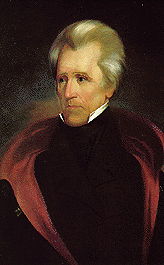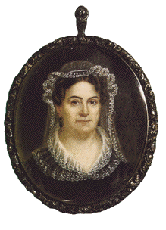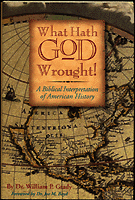



An excerpt (pp. 201-205) from the excellent book, "What Hath God Wrought! A Biblical Interpretation of American History." Click here for ordering information/link and to read about the author, Dr. Grady, and his book. "This book is guaranteed to change the way you look at history... Forever!" Andrew Jackson was president of the United States of America from 1829-1837. You may read a short biographical sketch at the White House web site by clicking here...
 The Battle of New Orleans had made
Andrew Jackson a national hero overnight. But mere early accomplishments can never
fill the void that exists in a lost man's soul. Besides, the humble general had
more sense than the editors of Laissez Faire Books concerning the ultimate cause
for his victory, acknowledging to a friend, "It appears that the unerring
hand of Providence shielded my men from the shower of balls, bombs, and rockets,
when every ball and bomb from our guns carried with them a mission of death."
(1)
The Battle of New Orleans had made
Andrew Jackson a national hero overnight. But mere early accomplishments can never
fill the void that exists in a lost man's soul. Besides, the humble general had
more sense than the editors of Laissez Faire Books concerning the ultimate cause
for his victory, acknowledging to a friend, "It appears that the unerring
hand of Providence shielded my men from the shower of balls, bombs, and rockets,
when every ball and bomb from our guns carried with them a mission of death."
(1)
Andrew Jackson was better known for his attendance at duels than at church, but on a particular Monday in October of 1818, he decided to visit a revival service in Nashville where the controversial Peter Cartwright was scheduled to speak. As it happened, the General entered as the preacher was reading his text, "For what shall it profit a man, if he shall gain the whole world, and lose his own soul?" (Mark 8:36) With all the seats already occupied, the famous Indian fighter and war hero was content to stand, gracefully leaning on the middle post. At the sight of his stately appearance, the host pastor, a certain "Brother Mac," became nervous in the extreme. Seated on the platform directly behind the pulpit, he tugged on Cartwright's jacket, whispering, "General Jackson has come in; General Jackson has come in." Cartwright was aghast at the pastor's double standard:
I felt a flash of indignation run all over me like an electric shock, and facing about to my congregation, and purposely speaking out audibly, I said, "Who is General Jackson? If he don't get his soul converted, God will damn him as quick as he would a Guinea negro." (2) The preacher tucked his head down, and squatted low, and would, no doubt, have been thankful for leave of absence. The congregation, General Jackson and all, smiled or laughed right out, all at the preacher's expense.
When the congregation was dismissed, my city-stationed preacher stepped up to me, and very sternly said to me: "You are the strangest man I ever saw, and General Jackson will chastise you for your insolence before you leave the city." "Very clear of it," said I, "for General Jackson, I have no doubt, will applaud my course; and if he should undertake to chastise me... there is two as can play that game."
Next morning, very early, my city preacher went down to the hotel to make an apology to General Jackson for my conduct in the pulpit the night before. Shortly after he had left I passed by the hotel, and I met the General on the pavement; and before I approached him by several steps he smiled, and reached out his hand and said: "Mr. Cartwright, you are a man after my own heart. I am very surprised at Mr. Mac, to think that I would be offended at you. No, sir; I told him that I highly approved of your independence; that a minister of Jesus Christ ought to love every body and fear no mortal man. I told Mr. Mac that if I had a few thousand such independent, fearless officers as you were, and a well drilled army, I could take Old England." (3)
Acknowledging that Jackson was "no doubt in his prime of life, a very wicked man," Cartwright relates the following story to illustrate the General's "great respect for the Christian religion, and the feelings of religious people, especially ministers of the Gospel":
I had preached one Sabbath near the Hermitage, and, in company with several gentlemen and ladies, went, by special invitation, to dine with the General. Among this company there was a young sprig of a lawyer from Nashville, of very ordinary intellect, and he was trying hard to make an infidel of himself. As I was the only preacher present, this young lawyer kept pushing his conversation on me, in order to get into an argument. I tried to evade an argument, in the first place considering it a breach of good manners to interrupt the social conversation of the company. In the second place I plainly saw that his head was much softer than his heart, and that there were no laurels to be won by vanquishing or demolishing such a combatant, and I persisted in evading an argument.
This seemed to inspire the young man with more confidence in himself; for my evasiveness he construed into fear. I saw General Jackson's eye strike fire, as he sat by and heard the thrusts he made at the Christian religion. At length the young lawyer asked me this question: "Mr. Cartwright, do you really believe there is any such place as hell, as a place of torment?" I answered promptly, "Yes, I do." To which he responded, "Well, I thank God I have too much good sense to believe any such thing."
I was pondering in my mind whether I would answer him or not, when General Jackson for the first time broke into the conversation, and directing his words to the young man, said with great earnestness: "Well, sir, I thank God that there is such a place of torment as hell." This sudden answer, made with great earnestness, seemed to astonish the youngster, and he exclaimed: "Why, General Jackson, what do you want with such a place of torment as hell?" To which the General replied, as quick as lightning, "To put such [expletive] rascals as you are in, that oppose and vilify the Christian religion." (4)
It was about this same time (1818)
that Jackson invaded the Spanish held territory of eastern Florida in order
to stop frontier attacks by the Seminole Indians. He eventually defeated the
Seminoles, drove out the Spanish and seized control of Florida. By the year
1828, Andrew Jackson was the undisputed people's choice for president. A contemporary
of the new chief executive wrote, "History is sure to preserve the name
of any man who has had the strength and genius to stamp his own character on
the people over whose destinies he presided." (5)
However, Jackson's greatest triumph came on the eve of his greatest personal tragedy. Before the new president could be sworn into office, his beloved wife succumbed to a massive heart attack. On Christmas Eve, 1828, Rachel Jackson [click here to read a biographical sketch] was laid to rest in her garden. A friend of the widower related, "I never pitied any person more in my life. .. I shall never forget his look of grief." (6)
Jackson had many enemies in the banking industry because of his incessant attacks on the nation's third central bank, called the Second Bank of the United States (a battle he would eventually win). In January of 1835, a bearded man attempted to assassinate the President, firing two pistols at him at point-blank range. For some reason, both guns failed to discharge. Having received a letter of concern from the King of England, Jackson wrote back exclaiming, "A kind of Providence had been pleased to shield me against the recent attempt upon my life, and irresistibly carried many minds to the belief in a superintending Providence." (7)
On March 4, 1837, President Jackson delivered his Farewell Address and reiterated the theme of America's unique destiny in world history:
You have the highest of human trusts committed to your care. Providence has showered on this favored land blessings without number, and has chosen you as the guardians of freedom, to preserve it for the benefit of the human race. May He who holds in His hands the destinies of nations, make you worthy of the favors He has bestowed, and enable you, with pure hearts and hands and sleepless vigilance, to guard and defend to the end of time, the great charge He has committed to your keeping. (8)
Retirement years brought on seasons of serious reflection. The seed sown by Peter Cartwright was finally ready to bear fruit as God's Word was not about to return void. Chamberlain writes:
The evening of his stormy life had come. The remains of his much loved wife were resting in the humble graveyard near the house. At last thoughts of eternity were forced upon him. After attending a series of religious meetings Jackson became greatly convicted of his sin. He passed the night walking in his chamber in anguish and prayer. In the morning he announced to his family his full conviction that he had repented of his sins, and, through faith in Jesus Christ, had obtained forgiveness. Family prayer was immediately established... he was privileged to read through the Bible twice. (9)
On May 29, 1845, only a few weeks before his death, Jackson declared:
Sir, I am in the hands of a merciful God. I have full confidence in his goodness and mercy.... The Bible is true... Upon that sacred volume I rest my hope for eternal salvation, through the merits and blood of our blessed Lord and Saviour, Jesus Christ. (10)
Finally, on June 8, 1845, just moments before he sailed into eternity, Jackson reassured everyone with these words:
My dear children, do not grieve for me; it is true, I am going to leave you; I am well aware of my situation. I have suffered much bodily pain, but my sufferings are as nothing compared with that which our blessed Redeemer endured upon the accursed Cross, that all might be saved who put their trust in Him... God will take care of you for me. I am my God's. I belong to Him. I go but a short time before you, and... I hope and trust to meet you all in Heaven, both white and black. (11)
Before expiring, Andrew Jackson made a last appeal for America to build her future on the blessed Word of God. "That book, Sir, is the Rock upon which our republic rests." (12) Hallelujah for the old time religion!
 668-pages
668-pagesContained within the pages of this
volume is an enlightening commentary on God's gracious relationship with the
United States of America. The esteemed patriot, Patrick Henry, declared unashamedly,
"It cannot be emphasized too strongly or too often that this great nation
was founded, not by religionists, but by Christians; not on religions, but on
the gospel of Jesus Christ."
The words, "What Hath God Wrought!" taken from Numbers 23:23, comprised
the inaugural message transmitted by the newly invented electric telegraph.
Professor Samuel F.B. Morse, a spiritual born- again believer, wanted the Lord
to receive the glory for his earthly accomplishments.
However, what God wrought - Satan sought! Unbeknown to most Americans, Christians
included, the devil hatched a subtle foreign conspiracy against the democratic
institutions of this land. While traveling abroad, Dr. Morse was providentially
made aware of this plot and subsequently authored two books to alert his endangered
countrymen.
Much of the evil in our nation today can be attributed to the ongoing effects
of this ideological intrusion. As the reader learns of these diabolical intrigues
throughout the ensuing chapters, it is hoped that he will rededicate himself
to both God and country in this present crisis four.
 Dr. William P. (Bill) Grady was born and reared
in New York City as a strict Roman Catholic. After attending the University
of Delaware and Goldey Beacom Business College, he sold office equipment for
three years before entering the airline industry as a marketing representative
for British Airways.
Dr. William P. (Bill) Grady was born and reared
in New York City as a strict Roman Catholic. After attending the University
of Delaware and Goldey Beacom Business College, he sold office equipment for
three years before entering the airline industry as a marketing representative
for British Airways.
Dr. Grady was saved and baptized in 1974 at the Marcus Hook Baptist Church in
Lynwood, Pennsylvania and called to preach later that year.
Having studied at Calvary Bible Institute and Philadelphia College of Bible,
he enrolled in Hyles- Anderson College, earning a B.S. in Pastoral Theology
and an M. Ed. in Christian Education. He received a D.D. from Anchor Baptist
Bible College in Pisgah Forest, North Carolina, and holds a Th. M. in English
Bible from Baptist International School of Theology and a Ph. D. in History
from Baptist International Seminary.
He founded and pastored the Kootenai County Baptist Church in Post Falls, Idaho
from 1981 to 1986 at which time he returned to Hyles-Anderson College as a faculty
member, continuing in that position through 1996.
Dr. Grady is also the author of the bestseller Final Authority: A Christian's
Guide to the King James Bible, now in its seventh printing. He presently serves
on the board of International Baptist Missions of Asheville, North Carolina
and is a frequent guest speaker at churches throughout the nation.
Bill and his wife, Linda, have three children, Daniel, Sara and Paul.
"It is the burden of [Dr. Grady] to disseminate the truth in this book. No prior permission is required to duplicate up to 3.000 words for non-commercial, non-salable or non-financial purposes. No part beyond this limit may be transmitted in any form or by any means, electronic or mechanical, including photocopying, recording, or by any information storage and retrieval system, without written permission from the publisher [Grady Publications, Inc., PO Box 506, Schererville, IN 46375 USA]"
Return to the Bible Believers' Home Page